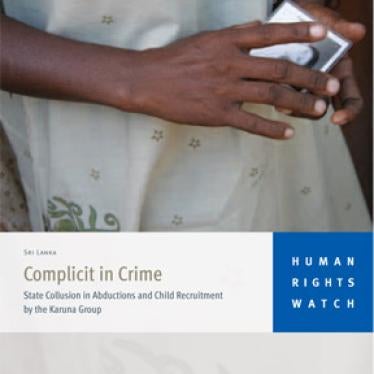(New York) - Sri Lankan authorities are using threats and intimidation to force civilians who fled recent fighting in Sri Lanka’s civil war to return home, Human Rights Watch said today. Government and military officials are threatening to cut aid and withdraw security for displaced persons who refuse to return.
Since March 12, the government has been returning people from at least six internally displaced person sites in eastern Batticaloa district. At least 771 individuals have been sent to Trincomalee district farther north as part of a plan to return approximately 2,800 internally displaced persons. To pressure individuals to return home, government officials and military personnel have threatened to withdraw humanitarian aid, food and other essential supplies. Some officials have threatened families that they would revoke their family cards, which entitle them to food rations. In some cases, the security forces have said that they would no longer be responsible for the security of the displaced persons who stayed behind.
“The Sri Lankan government says it will never force civilians to return home after they have been displaced by fighting,” said Brad Adams, Asia director of Human Rights Watch. “But there is clear and incontrovertible evidence that forced returns have begun, right under the noses of international observers.”
According to the United Nations High Commissioner for Refugees (UNHCR), an estimated 127,000 persons are displaced in Batticaloa district, of whom more than 40,000 fled fighting over the past week. Authorities have organized at least 21 buses to transport displaced persons from camps in Batticaloa to Trincomalee district. At one location, Zahira College, armored vehicles of the police’s Special Task Force led the convoy. The Special Task Force has been implicated in serious abuses against Tamil civilians during military operations against the armed opposition Liberation Tigers of Tamil Eelam (LTTE).
Thousands had fled Trincomalee in August after major fighting between government forces and the LTTE. Many sought shelter in the LTTE-controlled area of Vaharai, on the coast road between Trincomalee and Batticaloa, but later fled that area when the government defeated LTTE forces there this January. The LTTE tried but failed to block the departure of civilians from LTTE areas.
In interviews in February, more than a dozen displaced persons from Trincomalee and Vaharai told Human Rights Watch that they were afraid to go home. Most cited security concerns, particularly if fighting resumed between the government and the LTTE. Some said they were worried about reprisal killings by the military after an LTTE attack, as well as communal violence from Sinhalese communities.
“The situation is very bad in Mutur so we can’t go back,” said a 48-year-old fisherman, referring to his home town in the Trincomalee district, which he fled in August 2006. “We have said our homes are damaged, nothing is left there. We want to go, but security is a problem. Every day there are killings. How do we go back?”
In addition to returns to Trincomalee, the government last week returned some 200 families to the area of Vaharai, the former LTTE stronghold that the government overran in January. It is not clear to what extent those returns were genuinely voluntary.
“We would like to go back, but the government must give us security and essential items,” a 34-year-old father of three from Vaharai told Human Rights Watch. “We need fishing equipment. We need things to do our cultivation. The government has not said anything about providing this.”
The protection of displaced persons in Batticaloa is also under serious threat, Human Rights Watch said. Armed members of the Karuna group, a breakaway faction of the LTTE, have been seen in and around various camps, threatening and sometimes using violence against displaced persons. The group is also intimidating international nongovernmental organizations providing services to these camps. The group is known to have abducted at least four children from displaced persons camps in Batticaloa district. The LTTE is known to have abducted at least three children from camps in areas under their control.
“Pressuring displaced persons to return home goes against UN-recognized principles and is contrary to the Sri Lankan government’s repeated promises not to force people to return,” Adams said. “The government must only return people with their free consent, and provide aid and security for all those who decide to stay until conditions improve.”
Human Rights Watch said that the primary responsibility for ensuring the protection and security of displaced persons within the country lies with the Sri Lankan government. The LTTE is responsible for the protection of displaced persons in areas under its control.
UNHCR and dozens of nongovernmental organizations have been serving displaced persons in Sri Lanka. On March 13, UNHCR said that “heavy pressure has been applied on internally displaced people,” and cited local authority statements that assistance would be stopped if they stayed in Batticaloa.
“UNHCR and donor governments should be especially vigilant in monitoring these returns and should report frequently and publicly on conditions of return,” Adams said. “They should do everything possible to help these civilians in need.”
The UN Guiding Principles on Internal Displacement provide that every internally displaced person has the right to liberty of movement, the right to seek safety in another part of the country, and the right to be protected against forcible return to any place where their safety would be at risk.
The Sri Lankan government has forcibly returned displaced persons in the past. In September, the government sent between 15,000 and 25,000 displaced persons back to their homes in and around Mutur in Trincomalee district. While representatives for the displaced persons said that all wanted to return to their homes, many families wished to wait until they could be sure the area was safe and that renewed fighting was unlikely.







